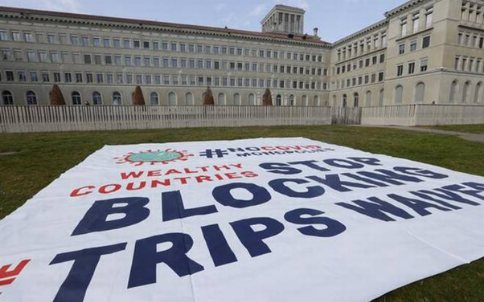New form of Feudal Calculus
This is the Reuters photo of Members of aid group Doctors Without Borders (MSF) were demonstrating outside the World Trade Organisation demanding to waive intellectual property rights on coronavirus disease (COVID-19) drugs before meeting on WTO’s Trade-Related Aspects of Intellectual Property (TRIPS) agreement in Geneva, Switzerland on March 4, 2021.
Also read: DGPs, CMs – Don’t clampdown on Covid Comments in Social Media
Why patent?
A patent is conferred by the state as an exclusive right to make, use and sell an inventive product or process. This monopoly is offered by state to an inventor so that the knowledge they developed comes into public domain and helps others to research further. The idea is that exclusive licenses promote invention and therefore benefit society as a whole, while the knowledge is developed further because it remains no more a secret.
Also read: Confusion over production, supply, and rate of vaccine
While the entire WTO mechanism is based on the market dynamics allowing maximum benefits out of competition, the IPR regime gives monopoly and curbs competition. This business model is imposed on the globe by the powerful corporate manufactures who are well established in their respective fields. Pharmaceuticals is one such field that is held by the IPR regime.
Also read: Why should patients die of lack of oxygen?
In countries like India, it should not be forgotten that the state has an obligation to ensure every person equal access to basic healthcare. But India inherited the colonial-era laws that expressly allowed for pharmaceutical patents. In 1959, a committee chaired by Justice N. RajagopalaAyyangar noted that with this patent regime it became difficult and not affordable to have access to medicine.
Also read: Curbs on webinars, scientific freedom at stake
The patent regime
Several foreign corporations used patents with the support of court injunctions to suppress competition from Indian entities that kicked up the prices of medicines. The Committee suggested the Parliament to change the Patents Act, 1970, to remove monopolies over pharmaceutical drugs, with patent protections limited over claims to processes. This policy helped tremendous growth of generic manufacturers in India. If we are having life-saving drugs at affordable prices, it was because of that policy.Then came in 1995 WTO regime pressurizing India with threat of sanctions to give product patenting also. Yale Law School professor Amy Kapczynski has criticized that compelling signatories to introduce intellectual property laws like those in the global north was nothing short of a scandal. When AIDS was devastating lives, several countries suffered as they could not access to medicine because of patent regime. India could withstand it because it did not give product patenting to the companies that helped heavy production of medicine under generic process facilitating availability of affordable medicines. India was successful in tackling the AIDS pandemic. But we have failed to learn the lessons from this experience. It is argued that there is a strong need to reward the inventions with monopoly over production and pricing for increase in research and development. They believed that patent regime will encourage more inventions in private sector. But surprisingly the public sector pharma industry was inventing more than the private sector. It is reported that the Moderna vaccine in US was developed in the National Institutes of Health, a US federal government agency and Indian Council of Medical Research has given know how for production of vaccine by Bharath Biotech. The Oxford/AstraZeneca vaccine is made with the share of 97% public money. Those big firms producing the medicines also should be transparent about the funds they received from. Big pharma has never been forthright about the quantum of monies funnelled by it into research and development. To say that innovation happens in private sphere is thus not completely true. Second point that supports patent regime is that patents is the only means to promote innovation. The innovation need incentive, but that need not be only through the monopoly for ten years where the diseased is made to pay individually a high price. Instead, economists suggested a prize fund by state to those companies who made life saving innovations is the best alternative.
Also read:How can Courts decide mala fides issues between two wings of State?
Request for IP waiver
India and South Africa submitted a joint petition in October 2020 to the World Trade Organization (WTO), requesting a temporary suspension of rules under the 1995 Agreement on Trade-Related Aspects of Intellectual Property Rights (TRIPS). Such a waiver was expected to help the world to contain virus and treatment. Around hundred nations believe that free exchange of know how will facilitate fast production of affordable medicine.
Also read: Why farmers rejected Govt’s positive proposal?
Congressman Rosa DeLauro, chairman of the House Appropriations Committee told the media: “The COVID-19 pandemic knows no borders and the need for vaccine development and dissemination across the globe is critically important. The TRIPS waiver raised by India and South Africa at the WTO would help the global community move forward in defeating the scourge of COVID-19 by making diagnostics, treatments, and vaccines available in developing countries.”
Also read: 1.3 Lakh farmers are consulted through webinars! And 2.23 crore contacted by SMS!!
The US could vaccinate the entire population but for other countries including India, it might take beyond 2024 to complete the task. The world should know that ‘corona virus’ anywhere is threat to life ‘everywhere’. To wipe out the virus, the world should act together and fast. The humanity and fight against pandemic should be preferred to monopolies and profits. The monopoly regime at least in relation to life saving vaccines and drugs against corona should be abandoned. If not, it will be a new form of feudal calculus in the words of the law professor Katharina Pistor.
Also read: Why is AG asking SC about police powers?




